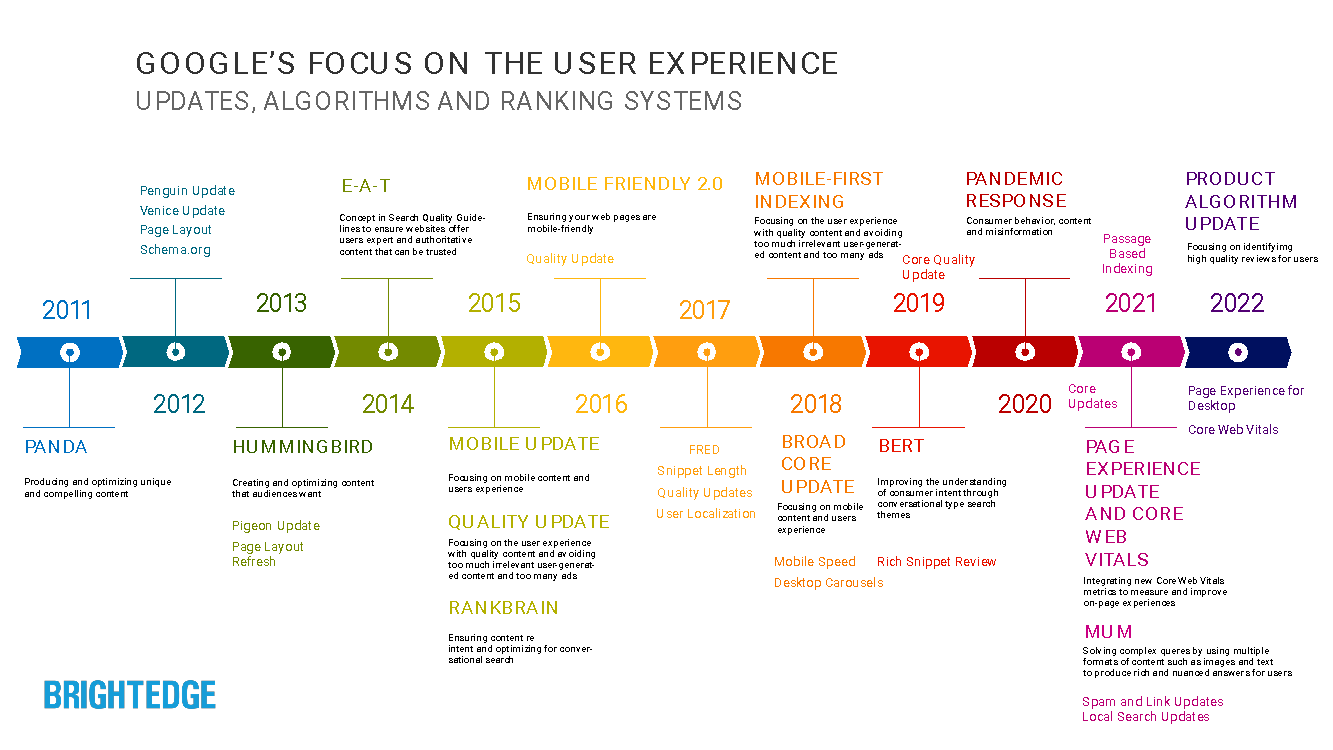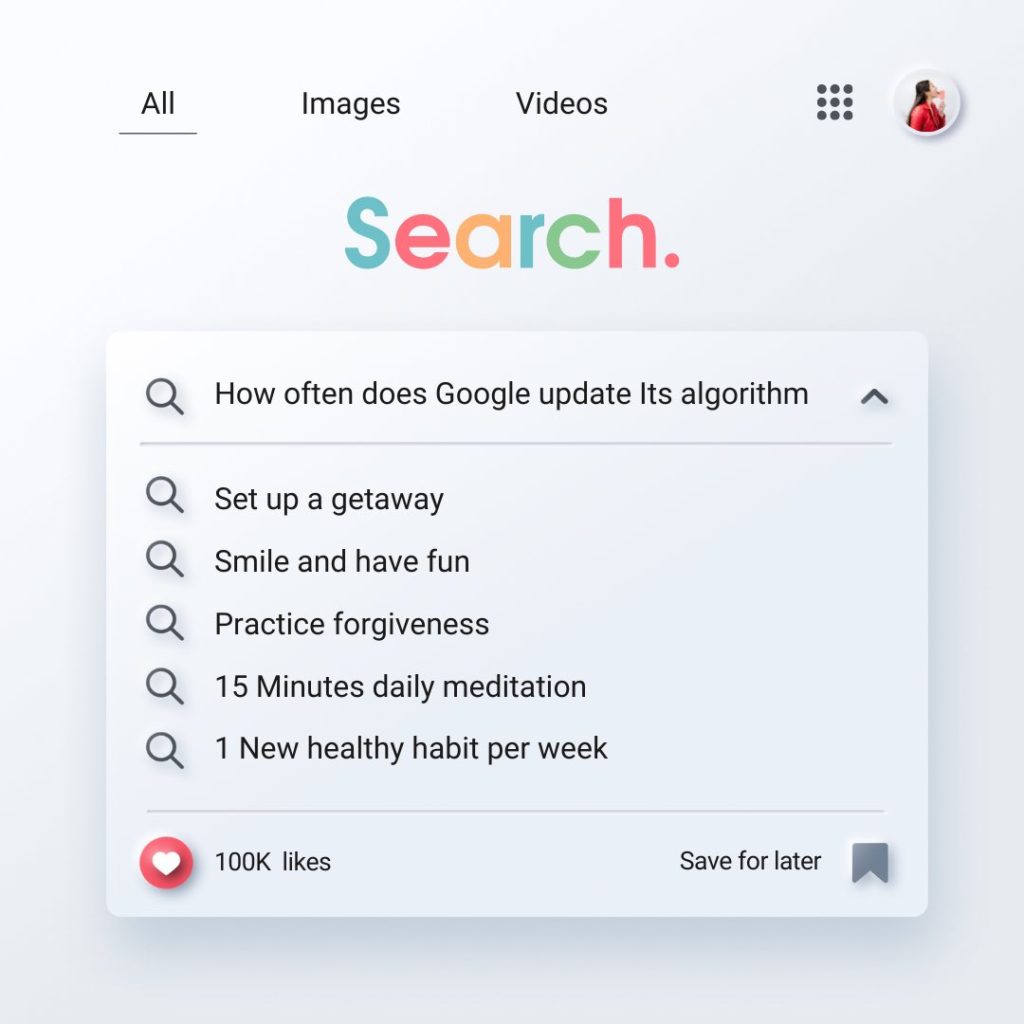Given the dynamic nature of Google’s search algorithm, which changes approximately 500 to 600 times per year, understanding the implications of these changes is vital for any successful SEO strategy. This constant flux, which equates to at least one or two changes per day, means that even seemingly insignificant modifications can substantially impact your search engine rankings and, thus, your business’s bottom line.
When it comes to SEO, Google’s algorithm is the be-all and end-all, determining which sites appear first in search results and significantly influencing your online visibility. Hence, both webmasters and SEO experts closely monitor any updates or changes to the algorithm. To aid in this process, tools such as Semrush Sensor provide invaluable insights, enabling you to stay ahead of these frequent adjustments and maintain a robust online presence.

Source: Search Engine Journal
But how can a small business owner be ready for a Google algorithm change? Here are a few tips:
Keep Up with the Latest SEO News and Changes
It’s important to keep up with the latest SEO news and changes so that your site is as visible as possible on Google. A little effort now can mean big rewards later! Find an SEO blog like ours, and keep up with the changes!
If you don’t have the time or don’t want to learn about SEO, consider hiring an experienced agency to help you… like us! We live and breathe SEO and will make sure your site is on the right track. Visit our SEO services page to learn more.
How Can Website Owners Prepare for Algorithm Changes?
Google’s algorithm is always changing, which can be a big problem for website owners relying on Google for traffic. After all, if you’re not on the first page of Google, you’re not going to get much traffic! So, how can you prepare for Google’s algorithm changes? Here are a few tips:
1. Keep your content fresh.
Google loves fresh content, so one of the best ways to prepare for algorithm changes is to regularly publish new and relevant content. A good rule of thumb is to aim for at least one new blog post per week. If you can’t keep up with that pace, try for one new post every two weeks. The important thing is to keep your site updated with fresh content on a regular basis.
True story: We once had a client who saw a significant drop in traffic after Google updated its algorithm. After some investigation, we discovered that the last time they’d published new content was six months earlier! Once we helped them get back on track with fresh content, their traffic quickly recovered.
Key Takeaway: Publishing fresh, relevant content is one of the best ways to prepare for Google algorithm changes. If you want to dive deeper into how Google’s ranking system works, check out our recent analysis of the Google Search Document Leak.
Related Reading: Why Your Business Should Have a Blog: 11 Reasons To Start Today!
2. Promote your content.
Just because you’ve published a new blog post doesn’t mean people will automatically find it. In order to get traffic from Google, you need to promote your content so that it shows up in search results.
One way to do this is through social media; share your new blog post on Twitter, Facebook, and other social networks. You can also promote your content by guest blogging on other sites or by leaving comments on related blog posts.
The more places your content appears online, the more likely it is to show up in Google search results.
Another true story: We had a client who was very active on social media but wasn’t seeing much traffic from Google. After taking a closer look, we discovered that their blog posts were rarely being shared, and they weren’t guest blogging or commenting on other blogs. Once we helped them promote their content more effectively, they started to see a nice uptick in traffic from Google.
Key Takeaway: In order to get traffic from Google, you need to promote your content so that it appears in search results.
Related Reading: How to Get More Engagement from your Social Media Posts
3. Monitor your traffic.
If you want to be prepared for algorithm changes, keeping an eye on your website’s traffic levels is important. That way, if you see a drop in traffic after an algorithm change, you’ll know immediately and can take steps to correct the situation.
There are a number of free tools available that make it easy to track your website’s traffic, such as Google Analytics. Checking your traffic levels on a regular basis will help you stay ahead of any potential problems.
You guessed it, another true story: We had a client who didn’t monitor their traffic levels and, as a result, didn’t realize their traffic had dropped significantly until we pointed it out to them. By that time, it was too late to do anything about it, and they lost a lot of valuable traffic.
Key Takeaway: Monitoring your website’s traffic levels will help you stay ahead of any potential problems.
Related Reading: Website Owners: Are you Tracking Conversions?
4. Keep an eye on your competitors.
If you want to be prepared for algorithm changes, keeping an eye on your competition is important. After all, if they’re doing something that’s working well for them, chances are it will work well for you too.
There are a number of free tools available that make it easy to track your competitors, such as Google Alerts. Checking in on what your competitors are doing on a regular basis will help you stay ahead of the game.
Key Takeaway: Keeping an eye on your competition will help you stay ahead of the game.
All of these ways to prepare for Google algorithm changes have one thing in common – they’re all about creating and promoting high-quality content. So if you want to be prepared for the next Google update, focus on creating and promoting great content, and you’ll be in good shape.
Related Reading: What is High-Quality Content, and How Do I Create It to Keep Google Happy?
Have you been hit by an algorithm change?
Have you seen your traffic drop after a Google update? Or maybe you’re just not getting the sales leads and conversions you’re hoping for? Whatever the case may be, we can help.
At BlakSheep Creative, we specialize in helping businesses recover from algorithm changes and other traffic-related problems. We’ve helped hundreds of businesses recover from Google penalties, Panda updates, and more.
Contact us today if you’re interested in learning more about how we can help you. We offer a free consultation so you can get to know us, and we can learn more about your business and your needs. Fill out the form below for your free consultation.



